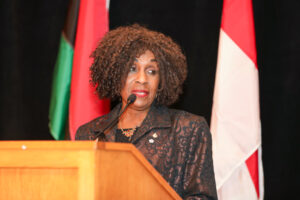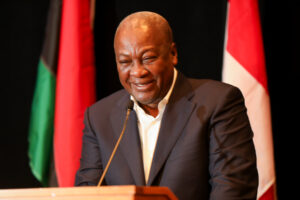Excited chatter filled the ballroom of the Marriott Hotel on the Halifax Waterfront on October 19th. Breakfast had just been served, but the delegates of the first Universities Studying Slavery Conference to be held in Canada were eager to abandon their tables, embracing and shaking hands, more interested in connecting with one another. Around the room, people engaged in conversation about their particular field of study, including a man at my table, a panelist who was eager to speak of his research.
Dr. Isaac Saney of Dalhousie University delivered opening remarks, with acknowledgment of both the Mi’kmaq and the rich Black history of the province. This was followed by a beautiful rendition of the Black national anthem “Lift Every Voice and Sing.” Afterwards, Wayn Hamilton performed a libation ceremony, a tradition that symbolically helps those present create connections to African heritage and history. For his libation ceremony, he selected water from two places, Beechville, N.S., and the Site of Last Bath in Ghana. In this way, he represented the journey that African ancestors had made. Following this, Russell Grosse, the Executive Director of the Black Cultural Centre for Nova Scotia, spoke about the event’s organization. He was followed by Twila Grosse, MLA for Preston and Nova Scotia’s first Black female cabinet minister, who stressed the importance of the conference.
 After breakfast, The Honourable Dr. Mayann Francis, known for her role in the posthumous pardon of Viola Desmond and for being the first African Nova Scotian to serve as Lieutenant Governor, introduced His Excellency John Mahama, former president of Ghana. Francis described how she had traveled to Ghana in the 1990s where she gave a speech as part of a women’s conference. Noting that nearly all of the women in the room were from Africa, and that all held PhDs, she described how they embraced her after the session, circling her, and telling her that she was theirs and that she would always have a home there. She then explained how she had a photo album of this time that she had shared with His Excellency, and that he would be taking it home with him.
After breakfast, The Honourable Dr. Mayann Francis, known for her role in the posthumous pardon of Viola Desmond and for being the first African Nova Scotian to serve as Lieutenant Governor, introduced His Excellency John Mahama, former president of Ghana. Francis described how she had traveled to Ghana in the 1990s where she gave a speech as part of a women’s conference. Noting that nearly all of the women in the room were from Africa, and that all held PhDs, she described how they embraced her after the session, circling her, and telling her that she was theirs and that she would always have a home there. She then explained how she had a photo album of this time that she had shared with His Excellency, and that he would be taking it home with him.
 Finally, His Excellency John Mahama took the stage. Holding various honorary degrees from universities in Africa and Europe, he is also the author of a book entitled “My First Coup d’Etat: And Other True Stories from the Lost Decades of Africa.” Under his administration, Ghana’s infrastructure, social justice, and equity all improved. This included the promotion of girls’ and women’s interests, such as the appointment of women in various roles of his government.
Finally, His Excellency John Mahama took the stage. Holding various honorary degrees from universities in Africa and Europe, he is also the author of a book entitled “My First Coup d’Etat: And Other True Stories from the Lost Decades of Africa.” Under his administration, Ghana’s infrastructure, social justice, and equity all improved. This included the promotion of girls’ and women’s interests, such as the appointment of women in various roles of his government.
Mahama’s speech focused on the subject of loss, particularly in the context of the transatlantic slave trade. He reflected on his own journey across the Atlantic Ocean in the comfort of an airplane, thinking of the enslaved Africans who had traveled that route before him, without that same comfort.
Approximately 10-20% of the enslaved people who made this journey lost their life from rough conditions, disease, or even by jumping overboard. However, these were far from the only losses stemming from the transatlantic slave trade: with the displacement of thousands of people from Africa, the continent lost its most valuable resource—its people.
Men, women and children were shipped away to other countries and used to build nations, far from the African continent. It is ironic that Africa is often described as poor and developing when Africans served as the backbone for a great number of nations. Considering this, Mahama questioned reparations and what they may look like.
How do we begin to look at the financial cost of slavery in order to settle on a number for reparations for the descendants of enslaved people and the African continent? Could a number even be placed on the emotional cost? These questions were at the forefront of my mind throughout the rest of the conference.
Mahama then turned his focus to his own country, Ghana, which has more slave fortresses and castles than any other nation. He focused on one site in particular; Cape Coast Castle, a popular site for people from the African diaspora to visit. There is a sense of spiritual reclamation as visitors walk in the footsteps of their ancestors, entering through the door that their ancestors had once been forced through. For me, this reclamation of lost histories is the very essence of the conference and the reason why it is so important.

